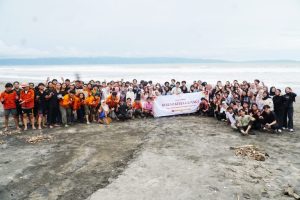|

The Department of Biology
Faculty of Mathematics and Natural Sciences Universitas Indonesia

All this time, students have often known microorganisms only as causes of disease. In fact, microorganisms also play a major role in producing nutritious foods that benefit human life, such as tempeh and yogurt. Based on this perspective, the Faculty of Mathematics and Natural Sciences, Universitas Indonesia (FMIPA UI), through the Department of Biology, organized a community service activity titled “Introduction to Microorganisms and the Production of Fermented Foods for Students of Shofiyyah Islamic School & Multimedia.”
The event, held at the Prof. Dr. Soemantri Brodjonegoro Auditorium and the Teaching Laboratory 2 of the Department of Biology, FMIPA UI, on Saturday (October 11, 2025), was attended by 33 students and 4 accompanying teachers from Shofiyyah Islamic School & Multimedia, Bogor. This program is part of the Department of Biology FMIPA UI’s commitment to enhancing science literacy and fostering interest in biotechnology among school-age students.

In this activity, participants were introduced to various types of microorganisms using the “Prof. Microbes” Science Literacy Kit, while also practicing the production of fermented foods such as yogurt and tempeh. The educational kit is an innovation by Prof. Wellyzar Sjamsuridzal, Ph.D., a Professor at the Department of Biology, FMIPA UI, designed to help students understand the world of microorganisms in an engaging way through simple, inquiry-based experiments.
The head of the community service team, Dr. Fitrianingsih, M.Eng., explained that the activity was designed to introduce the concept of microorganisms in a contextual and applicable manner. “Through this activity, we want to show that microorganisms are not only known as causes of disease but also play a significant role in biological processes that produce nutritious and beneficial foods,” she said. She expressed hope that this program would foster scientific curiosity and observational skills among students from an early age through hands-on practices they can apply at school.

In his opening remarks, Prof. Anom Bowolaksono, Ph.D., Head of the Department of Biology, FMIPA UI, stated that this community service activity serves as a bridge between universities and secondary schools to strengthen young people’s interest in life sciences. “We want to bring life sciences closer to everyday life so that the younger generation not only learns the theory but also understands its applications,” he said.
After the opening session, participants took part in practical activities involving the isolation of microorganisms from soil and leaf samples, as well as the production of fermented foods, guided directly by lecturers from the Department of Biology, FMIPA UI—Prof. Dr. Nining Betawati Prihantini, M.Sc., Dra. Sitaresmi, M.Sc., Dr. Dian Hendrayanti, M.Sc., Dr. Riani Widiarti, M.Si., and Dr. Mazytha Kinanti Rachmania, M.Si. In addition to the laboratory sessions, participants joined an educational tour to the Orchid House and Greenhouse of the Department of Biology, UI, where they learned about plant conservation and the application of biotechnology within the campus environment.
Through this activity, the students not only learned about the role of microorganisms in daily life but also gained an understanding of the interconnections between biology, food, health, and technological innovation. This program also supports the achievement of several Sustainable Development Goals (SDGs), including good health and well-being through food fermentation education, quality education through contextual and interactive biology learning, the strengthening of innovation in simple biotechnology, and responsible consumption and production through the sustainable use of local resources.

After the on-campus activities, the students continued their observations at school to monitor the growth of microorganism colonies and the changes in their fermented products. The participants’ enthusiasm was evident from their eagerness to discuss and record their scientific observations on the worksheets provided.
A representative from the school, Mrs. Ayuningsih, S.Si., expressed her appreciation for the activity, noting that it made science learning feel more engaging and relevant. “The students have become more enthusiastic about studying biology because they can directly see how science works in real life,” she said.
Through this activity, the Department of Biology, FMIPA UI, hopes that more schools will be inspired to implement engaging and relevant science learning based on simple practical approaches that can spark scientific curiosity among the younger generation.
